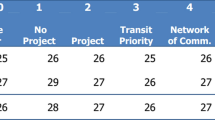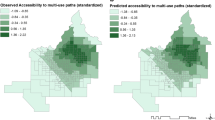Abstract
The capability approach (CA) is a theoretical framework that emphasizes the moral significance of individuals’ capability to achieve outcomes that they value and have reason to value. It focuses on the actual opportunities that people have given their personal and social circumstances. This approach is grounded in the attempt to address fundamental deficiencies of the utilitarian approaches to welfare economics and to raise equity issues. In this work, we explore CA in the context of the transportation field. We develop a new measure, “Value of Capability gains” (VOC), designed to account for both efficiency and equity considerations as the key benefits taken into account in a Cost Benefit Analysis. We utilize activity-based models to assess travelers’ capabilities under different transportation improvement scenarios. By using the activity-based accessibility measure to reflect individuals’ abilities to reach alternatives that are potentially achievable, in accordance with the CA approach, the principle of diminishing marginal utility can be activated and applied to accessibility as a quantity of good or service—so that the more alternatives available to the traveler, the smaller the marginal benefit from an additional alternative. We use the VOC measure to examine different transportation scenarios in a simple synthetic case study, demonstrating that this new measure better accounts for equity.
Similar content being viewed by others
References
Alkire, S., Foster, J.: Counting and multidimensional poverty measurement. J. Public Econ. 95(7–8), 476–487 (2011). https://doi.org/10.1016/j.jpubeco.2010.11.006
Alkire, S., Santos, M.: A multidimensional approach: poverty measurement & beyond. Soc. Indic. Res. 112(2), 239–257 (2013). https://doi.org/10.1007/s11205-013-0257-3
Alkire, S., Santos, M.E.: Measuring acute poverty in the developing world: robustness and scope of the multidimensional poverty index. World Dev. 59, 251–274 (2014). https://doi.org/10.1016/j.worlddev.2014.01.026
Alkire, S., Meinzen-Dick, R., Peterman, A., Quisumbing, A., Seymour, G., Vaz, A.: The women’s empowerment in agriculture index. World Dev. 52, 71–91 (2013). https://doi.org/10.1016/j.worlddev.2013.06.007
Anand, P., van Hees, M.: Capabilities and achievements: an empirical study. J. Socio-Econ. 35, 268–284 (2006)
Anand, P., Hunter, G., Carter, I., Dowding, K., Guala, F., Van Hees, M.: The development of capability indicators. J. Hum. Dev. Capab. 10(1), 125–152 (2009)
Anand, P., Krishnakumar, J., Tran, N.B.: Measuring welfare: latent variable models for happiness and capabilities in the presence of unobservable heterogeneity. J. Public Econ. 95(3), 205–215 (2011)
Arneson, R.: Egalitarianism. Stanford Encyclopedia of Philosophy. Stanford University, Stanford (2002)
Attias-Donfut, C.: Actions intergénérationnelles et développement durable en milieu rural. Gérontologie et société 146(3), 117–129 (2013)
Bajmócy, Z., Málovics, G., Gébert, J.: On the informational basis of regional innovation policy: from growth to capabilities. Eur. Plan. Stud. 22(7), 1325–1341 (2014)
Bertolini, L., Le Clercq, F., Kapoen, L.: Sustainable accessibility: a conceptual framework to integrate transport and land use plan-making. Two test-applications in the Netherlands and a reflection on the way forward. Transp. Policy 12(3), 207–220 (2005)
Beyazit, E.: Evaluating social justice in transport: lessons to be learned from the capability approach. Transp. Rev. 31(1), 117–134 (2011)
Bills, T.S., Walker, J.L.: Looking beyond the mean for equity analysis: examining distributional impacts of transportation improvements. Transp. Policy 54, 61–69 (2017)
Bills, T., Sall, E., Walker, J.: Activity-based travel models and transportation equity analysis: research directions and exploration of model performance. Transp. Res. Rec. J. Transp. Res. Board 2320, 18–27 (2012)
Binder, M., Broekel, T.: Applying a non-parametric efficiency analysis to measure conversion efficiency in Great Britain. J. Hum. Dev. Capab. 12(2), 257–281 (2011)
Boni, A., Peris, J., Hueso, A., Rodilla, J.M., Lozano, J.F.: Capabilities for a cosmopolitan citizenship in higher education The experience of the Technical University of Valencia. Procedia-Soc. Behav. Sci. 9, 1998–2002 (2010)
Burchardt, T., Le Grand, J.: Constraint and opportunity: identifying volontary non-employment. CASE Working Paper No. 55 (2002)
Chilton, M., Chyatte, M., Breaux, J.: The negative effects of poverty & food insecurity on child development. Indian J. Med. Res. 126(4), 262 (2007)
Coast, J., Smith, R., Lorgelly, P.: Should the capability approach be applied in health economics? Health Econ. 17(6), 667–670 (2008)
Dagsvik, J.K.: Making Sen’s capability approach operational: a random scale framework. Theor. Decis. 74(1), 75–105 (2013)
Dang, A.T.: Amartya Sen’s capability approach: a framework for well-being evaluation and policy analysis? Rev. Soc. Econ. 72(4), 460–484 (2014)
De Jong, G., Daly, A.J., Pieters M., van der Hoorn A.I.J.M.: The logsum as an evaluation measure: review of the literature and new results. In: The 45th Congress of the European Regional Science Association, 23–27 Aug 2005, Vrije Universiteit Amsterdam (2005)
Dong, X., Ben-Akiva, M.E., Bowman, J.L., Walker, J.L.: Moving from trip-based to activity-based measures of accessibility. Transp. Res. A 40, 163–180 (2006)
Gálvez-Muñoz, L., Domínguez-Serrano, M., Rodríguez-Modroño, P., Matus-López, M.: Gender, time use, and children’s and adolescents’ well-being: implications for public policies. Fisc. Stud. 34(3), 373–389 (2013)
Grasso, M.: A normative ethical framework in climate change. Clim. Change 81(3–4), 223–246 (2007)
Halai, A.: Equality or equity: gender awareness issues in secondary schools in Pakistan. Int. J. Educ. Dev. 31(1), 44–49 (2011)
Hayashi, Y., Morisugi, H.: International comparison of background concept and methodology of transportation project appraisal. Transp. Policy 7(1) (2000)
Hickman, R., Cao, M., Mella Lira, B., Fillone, A., Biona, J., Lopez, N.: Understanding capabilities, functionings and travel in high and low income neighbourhoods in manila. Soc. Incl. 5, 161–174 (2017)
Hocking, C., Townsend, E.: Driving social change: occupational therapists’ contributions to occupational justice. World Fed. Occup. Ther. Bull. 71, 68–71 (2015)
Kenworthy, J.R., Lanbe, F.: Patterns of automobile dependency in cities: an internal overview of key physical and economic dimensions with some implications for urban policy. Transp. Res. Part A 33(7–8), 791–723 (1999)
Kaplan, S., Prato, C.G.: Closing the gap between behavior and models in route choice: the role of spatiotemporal constraints and latent traits in choice set formation. Transp. Res. Part F Traffic Psychol. Behav. 15(1), 9–24 (2012)
Lorgelly, P.K.: Choice of outcome measure in an economic evaluation: a potential role for the capability approach. Pharmacoeconomics 33(8), 849–855 (2015)
Lozano, J.F., Boni, A., Peris, J., Hueso, A.: Competencies in higher education: a critical analysis from the capabilities approach. J. Philos. Educ. 46(1), 132–147 (2012)
Martens, C.J.C.M.: Grounding transport planning on principles of social justice. Berkeley Plan. J. 19(1) (2006)
Martens, K.: Justice in transport as justice in accessibility: applying Walzer’s ‘Spheres of Justice’ to the transport sector. Transportation 39, 1035–1053 (2012)
Martens, K.: Why Accessibility Measurement is Not Merely an Option, but an Absolute Necessity. Accessibility Tools and Their Applications. Routledge, London (2016)
Nahmias-Biran, B., Shiftan, Y.: Towards a more equitable distribution of resources: using activity-based models and subjective well-being measures in transport project evaluation. Transp. Res. Part A Policy Pract. 94, 672–684 (2016)
Nahmias-Biran, B., Martens, K., Shiftan, Y.: Integrating equity in transportation project assessment: a philosophical explorations and its practical implications. Transp. Rev. 2, 192–210 (2017)
Nussbaum, M.C.: Women and Human Development: The Capabilities Approach. Cambridge University Press, Cambridge (2000)
Polat, F.: Inclusion in education: a step towards social justice. Int. J. Educ. Dev. 31(1), 50–58 (2011)
Prud’homme, R., Lee, C.: Size, sprawl and the efficiency of cities. Urban Stud. 36(11), 1849–1858 (1999)
Restrepo-Ochoa, D.A.: Health and the good life: contributions by Amartya Sen’s capability approach to ethical reasoning in public health. Cadernos de Saúde Pública 29(12), 2371–2382 (2013)
Schwanen, T., Dijst, M.: Travel time ratio for visits to the workplace: the association between commuting time and work duration. In: Paper Presented at the TRB Congress, Washington, January (2001)
Sen, A.K.: Commodities and Capabilities. North-Holland, Amsterdam (1985)
Smith, N., Hirsch, D., Davis, A.: Accessibility and capability: the minimum transport needs and costs of rural households. J. Transp. Geogr. 21, 93–101 (2012)
Walker, M.: Towards a capability-based theory of social justice for education policy-making. J. Educ. Policy 21(2), 163–185 (2006)
Wang, F.-K., Hsu, C.-H., Tzeng, G.-H.: Applying a hybrid MCDM model for six sigma project selection. Math. Probl. Eng. (2014). https://doi.org/10.1155/2014/730934
Wiel, M.: Ville et Automobile. Descartes and Cie, Paris (2002)
Wismadi, A., Zuidgeest, M., Brussel, M., van Maarseveen, M.: Spatial preference modelling for equitable infrastructure provision: an application of Sen’s capability approach. J. Geogr. Syst. 16(1), 19–48 (2014)
Acknowledgements
The authors would like to thank the Israel Science Foundation (ISF) and the International Foundation for Education (ISEF) for their financial support.
Author information
Authors and Affiliations
Contributions
B. Nahmias-Biran: Literature Search and Review, Manuscript Writing, Meta-Analysis and Content planning. Y. Shiftan: Manuscript writing and Editing, Content planning.
Corresponding author
Additional information
Publisher's Note
Springer Nature remains neutral with regard to jurisdictional claims in published maps and institutional affiliations.
Rights and permissions
About this article
Cite this article
Nahmias-Biran, Bh., Shiftan, Y. Using activity-based models and the capability approach to evaluate equity considerations in transportation projects. Transportation 47, 2287–2305 (2020). https://doi.org/10.1007/s11116-019-10015-9
Published:
Issue Date:
DOI: https://doi.org/10.1007/s11116-019-10015-9








